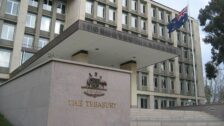Advisers regain control of their future
To say the last few years have been testing for advisers would be a gross understatement. The reverberations of the Hayne Royal Commission, which highlighted important issues, though mainly those faced by vertically integrated institutions, has led to a big increase in compliance costs and regulatory hurdles. The result in many cases has been the loss of thousands of heads from the industry, and the increasing cost of financial advice that is desperately needed by many Australians.
The need for advice couldn’t have been made more clear than in 2020 when the position of advisers as the only people at the coalface of client discussions was cemented. When global sharemarkets were falling by 7% in a single day – or 30% in less than four weeks – clients weren’t calling their fund managers, custodians, or super fund trustees, they were calling you; their financial adviser.
This seems to be one of the many facts forgotten by the financial press, investment management and associated industries. When a 70-year old widow is stressed because her life savings have fallen in value by one-third, her financial adviser is required to deal with not only the investment options available, but the mental and physical health implications. Advisers are the frontline workers of the financial advice industry and with this role comes unique stress of its own.
As we emerge, hopefully, from the darkest period for worldwide health and worldwide economic uncertainty in living memory [while remembering that there have been two world wars], it’s worthwhile thinking about some positives which have co-existed with the many negatives.
As many of our columnists, contributors and journalists commented, the world has probably changed forever. People are choosing a simpler life, some leaving the cities behind. Companies have seen the wisdom in greater workplace flexibility, such as working from home as a choice. The acceleration in many trends, such as online transacting, should lead to increased productivity and therefore economic growth.
Most governments, including Australia’s federal and state elected representatives, stepped up for the crisis. Notwithstanding the mistakes, they have baled us out. And, as it was with the stories published in Inside Adviser, good news items as well as bad proved to be well-read.
When I took over the publication of this title, my sole aim was to provide content that was relevant and useful to advisers in running their businesses, educating their clients and making sound investment decisions. There has been a tendency for our industry to highlight the worst, rather than best examples of advice, in response to which we will be running a profile on leading advisers throughout 2021.
Interestingly, the most popular articles of 2020 had a more positive tone:
- The machinations of the Financial Advice Standards and Ethics Authority (FASEA) were increasingly popular. Whether it was the evolving nature of the ‘toothless’ standard-setting body, the delay to education requirements, the complexity of the various standards, or ultimately its demise, advisers showed keen interest.
- On a similar note, the extensive work of Minister Jane Hume and Treasurer Josh Frydenberg in navigating the body of regulatory work was a popular talking point. On the one hand, the simplification of reporting for advisers was well-received, including the more recent changes to Opt-In and Fee Disclosure Statement requirements, while flagged licensing changes for insurance claims clearly surprised readers.
- The big names continued to get the eyeballs, with CIO of Magellan, Hamish Douglass, among the most read, after flagging a positive view ahead of the US election. In hindsight, the decision to reduce cash levels ahead of the election, add to existing large-cap Chinese names and highlight legislative risk around big tech, couldn’t have been more prescient.
- Magellan was in the news again, joining the likes of Loftus Peak in launching a ‘game changer’ active exchange trade fund (ETF), or “quoted fund,” through its Airlie Funds Management business. The growing popularity of these new products, with an extensive queue of managers reportedly lining up, offers another option for advisers to streamline their administration and implementation processes. It also places pressure on platforms and traditional managed fund providers to improve turnaround times.
As the calendar turns over once again, the advice industry is showing signs of coming together. Clearly, we all face the same problems on a daily basis, whether that is navigating a complex regulatory environment, dealing with the mental burden of being at the coalface of client worry, navigating the most uncertain investment environment in several decades, and now, dealing with more product providers marketing directly to investors. As we enter 2021, we hope that it is remembered as the Year of the Adviser.
This is the last edition of Inside Adviser for 2020. The first edition of 2021 will be published on January 12.
We wish all our readers, advertisers and sponsors all the best for the festive season and new year.











